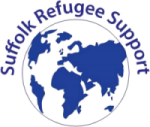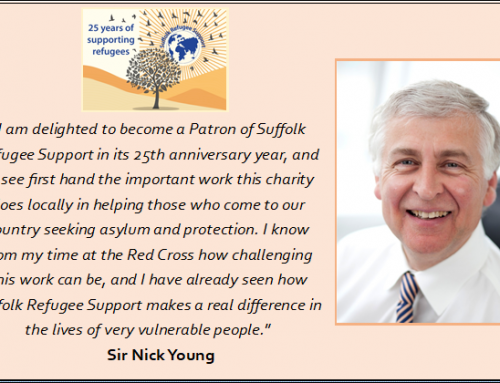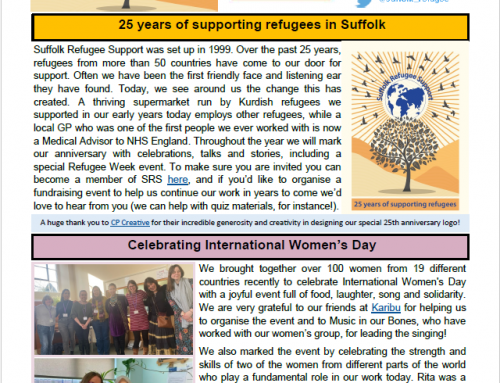In the six months since Russia invaded their country, more than 1000 Ukrainian refugees have arrived in Suffolk under the Homes for Ukraine scheme, with more joining family members here under the Ukraine Family scheme. People have settled in communities the length and breadth of the county, children have been welcomed into local schools, adults have found employment, and many new friendships have been made. None of this would have been possible without the incredible generosity of hosts and community groups across Suffolk. However, we know there is still a great deal of uncertainty about the future, both for Ukrainian refugees and their UK hosts. At Suffolk Refugee Support we continue to provide a wide range of advice and services, supporting people into employment and training, helping with benefits applications, facilitating access to ESOL classes, visiting community hubs, organising social events and providing SIM cards.
Homes for Ukraine – next steps
As many sponsors start to approach the minimum 6 months’ hosting commitment there is a lack of clarity and information as to what happens next. A recent
Office for National Statistics survey suggested around one fifth of hosts could only continue their commitment for six months, while two thirds would not be able to continue beyond 12 months. We have consistently raised the need for clear housing solutions and host support information in meetings with DLUHC (the government department responsible), local authorities and other partners. We know that none of the current options are straightforward, and that moving into the private rented sector will be very difficult for many Ukrainian refugees. We are hoping the government will also announce improved support for hosts—both increased thank you payments and an extension of these payments beyond 12 months—and we have raised directly with them the urgent need for hosts and guests to have this information as they make difficult decisions.
At this stage, government guidance where hosting arrangements cannot continue beyond 6 months is as follow
1) If a sponsorship arrangement ends, or is at risk of ending, before 6 months, you should contact your local council to make them aware. They will only be able to help guests find a new host if they decide it is not suitable or safe for the guest to stay in the current arrangement or if the host has failed their checks. If a guest moves in with a new host without the agreement of the council, the new host may not receive their thank you payments.
2) If a sponsorship arrangement cannot continue beyond 6 months, but the guest is not ready to move into their own accommodation, they can try to find a new host through local community or faith groups, or through organisations which are helping to provide a matching service, such as Reset.
3) If a guest is struggling to find a new host through these channels, they can contact Suffolk County Council who may be able to help. You can find out more information and contact details through the housing section of Suffolk County Council’s information guide here.
4) If a guest is ready to look for private rented sector accommodation, they can find guidance in the Suffolk County Council information above, or a how to rent guide in Ukrainian here.
How to register as a host
Due to the continued need for safety for Ukrainian refugees, alongside the need for new sponsors after the initial 6 month minimum hosting period, potential new hosts are being asked to register for the Homes for Ukraine scheme. We encourage people to research the scheme thoroughly and think through carefully what it will mean for you and your family. Refugees applying to the scheme are likely to be traumatised and vulnerable, separated from loved ones who are in direct danger back home and may need specialist support. Rural locations might also be unsuitable for some people as they can lead to isolation and barriers to accessing employment and services.
If you would like to register to offer accommodation to Ukrainian refugees, you should do so through the UK government’s website here. Or if you are already registered and would consider hosting more refugees, you can contact Suffolk County Council here: refugeesupport@suffolk.gov.uk
If you are hosting or thinking of hosting Ukrainian refugees, you might like to join the Together for Suffolk – Ukraine Support Group Facebook page, where hosts across the county can share experiences and access guidance.
How to be matched safely with a refugee
If you have registered with the Homes for Ukraine scheme and are looking for a way to be matched with a refugee, Reset (who help communities welcome refugees) are matching people and providing training and support. Theirs is the only government-endorsed matching service, and we recommend it so that the process can be managed securely and the most vulnerable people given a route to safety. You can fill in Reset’s host form here.
Citizens UK have also set up a Communities for Ukraine programme matching refugees with sponsors and providing ‘end-to-end’ support through the process: https://www.citizensuk.org/campaigns/communities-for-ukraine/
We recommend you are cautious about sharing information through other matching websites, particularly those run by unregistered organisations, and we strongly advise against organising matches through social media. There is growing evidence that this kind of matching is putting vulnerable people at risk.
Once your guest has arrived
As well as the need for new hosts and the issues outlined above around next steps for Ukrainian refugees who have been here for a while, we are also aware that new guests are arriving in Suffolk all the time. Here are some of the important things to consider for newly-arrived Homes for Ukraine refugees and their hosts:
Universal Credit – applications should be made online (see ways we can help below). You can find more guidance here. To apply for Pension Credit, phone 03456 053 000 to be connected to the dedicated team dealing with Ukrainian applications.
School places – applications should be made to Suffolk County Council’s School Admissions Team for community and voluntary controlled schools, or directly to academies and voluntary aided schools
Bank accounts – we are aware of a mixed picture, with some banks requiring proof of address and in-branch offerings being quite inconsistent (it seems to be easier with some banks if the host is an existing customer), but NatWest are offering a special account for Ukrainian refugees, while some hosts are choosing the online bank Monzo for speed
SIM cards – we have free Vodafone SIM cards available (see ways we can help below)
£200 one-off payment for refugees/£350 monthly sponsor payment – to arrange these with Suffolk County Council, follow the guidance here for the guest payment, and here for the sponsor payment. Please note, these payments are currently only available to hosts and refugees under the Homes for Ukraine scheme.
Biometric Residence Permit (BRP) – unless your guest has attended a visa application centre and given their biometrics already, their entry stamp will be valid for the first six months only. To extend their stay for up to the three years allowed under this scheme, they will need to apply for a Biometric Residence Permit. This will require them to provide biometric information, including a photograph of their face and a sample of fingerprints. You can apply for a BRP once arrived in the UK here.
English classes – we can help you to access English classes (see ways we can help below)
Ukraine Family Scheme
We are keenly aware that refugees arriving in Suffolk to join family members under the Ukraine Family Scheme are receiving less support than those arriving under the Homes for Ukraine scheme, and often find themselves in more difficult circumstances. We are advocating for increased support for this group and delivering priority casework to people in this situation. If you are here under the family scheme and need our support, please see below for how to get in touch.
How we can help
We are providing practical support to Ukrainian refugees arriving in Suffolk, to help them access services, find employment and feel secure in their new environment. We are seeing families in our Ipswich office, supporting hosts and guests via telephone and email, and working with partners to put in place further specialist advice and guidance.
If you are a Ukrainian refugee in Suffolk or you are hosting a Ukrainian family and you need support in the following areas, please do get in touch with us on 01473 400785 or by email: office@suffolkrefugee.org.uk
SIM cards – we can provide Vodafone SIMs free for refugees in Suffolk preloaded with 20GB of data per month plus unlimited UK texts and calls for six months. This can be vital in making sure people arriving have a phone number in order to register for other services.
English classes – we can help you to access ESOL assessments and English classes either delivered by Suffolk Refugee Support or partners across the county
Employment advice – we can offer specialist employment and training advice, helping refugees to access the local employment market, training courses and further education
Benefits applications – we can provide advice with applications where refugees and hosts are finding it difficult to complete forms themselves online
Further information and resources
Suffolk County Council have lots of useful information for sponsors and guests
The British Red Cross are offering £50 cash assistance per person to Ukrainian refugees who have entered the UK in the last 14 days (with valid visa/approved entry document). Payments can take 4 weeks to arrive. To apply, phone 08081963651.
Reset have a comprehensive Sponsor Toolkit here and are running webinars for hosts
The UK government are providing answers to common questions on their FAQs page here, including details on accommodation requirements
NACCOM have a variety of specialist hosting resources here, including Good Practice Guides, sample Host/Guest Agreements, Kids’ Guide to Hosting, and Understanding Trauma
Ukrainians Welcome provides useful information (in Ukrainian, English and Russian) on how to stay safe, informed and supported for Ukrainians in the UK
Asylum Welcome have lots of guidance on the scheme and links to useful resources here
Community Action Suffolk provide support and guidance to local community groups – you can email them here: ukrainesupport@communityactionsuffolk.org.uk
There is information on bringing pets to the UK and quarantine requirements here
Suffolk Mind have a mental health support page for anyone affected by the war in Ukraine here
Barnardo’s have a free helpline offering support to anyone arriving in the UK from Ukraine
What you can do
We are looking for volunteers who speak fluent Ukrainian (as well as English) to help us support Ukrainian refugees. If you are interested you can find out more about registering as a volunteer with us here. We are not taking or coordinating any donations of items at this stage, but will put out appeals for items on our Facebook page as and when they are needed. If you would like to support our work with Ukrainian refugees, you can pledge your support securely here.
We are also continuing to provide vital support to refugees and asylum seekers forced to flee conflict, violence and persecution elsewhere, including Afghans recently arrived in the UK. Suffolk Refugee Support have responded to the needs of vulnerable refugees arriving here since 1999, and last year we gave more than 7000 advice contacts to people from 43 countries. With record numbers of people displaced from their homes around the world, demand for our services has never been higher, but we will continue to provide a warm welcome and long term support to refugees and asylum seekers in Suffolk, however they arrive and whatever their needs. If you would like to receive our updates and newsletters automatically, you can sign up to our mailing list here.
As we continue to see the incredible generosity of the British public towards vulnerable refugees, it is worth emphasising that there are no safe, legal routes for traumatised people fleeing conflict and persecution in many parts of the world to apply for asylum in the UK. Two thirds of those who reach the UK via informal routes are proven to need our protection. You can read our response to government plans to send asylum seekers to Rwanda here. The current refugee crisis also serves as a reminder that more than 85% of the world’s refugees are hosted by countries neighbouring their own. Often these are poorer or developing countries – for instance, Turkey currently hosts around 4 million refugees, Uganda 1.5 million, Pakistan 1.4 million, and around a quarter of Lebanon’s total population are refugees. Poland has taken in more than 3.5 million Ukrainian refugees since the beginning of the war.


